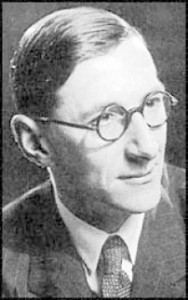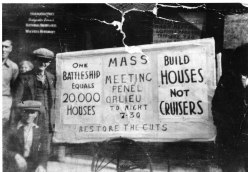Liberals
In an impressive show of local solidarity, Bridgwater’s progressives more or less united behind Bartlett, standing as an Independent Progressive.
The Bridgwater Liberal Association agreed very quickly not to stand a candidate and support Bartlett. They went as far as donating their election agent, Harold Scholfield, the solicitor of 4 Fore Street, to the Bartlett campaign, and a majority of local elected Liberals worked to back Acland’s unity candidate.
However, the fixer-in-chief and most influential local Liberal was undergoing a dramatic conversion, rapidly losing his Liberalism in favour of an almost religious devotion to socialism and collect security.
Richard Acland MP was always an unusually progressive Liberal. A dedicated member of Victor Gollancz’s Left Book Club, his shifting political allegiances had been profoundly shaped by a chapter in a book by fellow Liberal, the economist John Maynard Keynes, that described capitalism as “running on the basis of casino”.
Acland was a key mover in bringing about Bridgwater’s by-election. When interviewed near the end of his life in 1988, Acland confirmed he chose Bridgwater to make his stand because “the votes of the progressive parties were roughly even” and happily admitted engineering the town’s Tory MP, Croom-Johnson, being appointed a high court judge “by which he would have to resign his seat thus causing the vacancy that allowed the calling of the election at that crucial time.”
Acland had originally approached Langdon Davies , an author whose book ‘Silent Approach’ warned of German intentions, but after an initial visit to the town he withdrew, due to his scepticism about the prospects of success and uncertainty about the co-operation of the local Labour Party.
It was Acland who personally visited Bartlett at his Gower Street home in London, along with their mutual friend, Reverend Creswell Webb, the vicar of Oare on Exmoor. Webb and Bartlett had served side by side in the First World War. Together, Acland and Webb persuaded the broadcaster to be their candidate.
Acland was the powerhouse behind Bartlett’s campaign. He usually opened public meetings for him. Tom Wintringham, veteran socialist, described these occasions: ” Acland, tall, lanky and earnest, was an inspired but intuitive public speaker and waved his arms about and shouted exultantly like a revivalist preacher.”
Acland had his fair share of critics however. H.G. Wells was outspoken in his dislike: “from the Revolutionary point of view he is a thoroughly bad character. His intelligence is very limited and unstable, he is as imitative as a monkey, any claptrap that seems to be popular goes into his bag and any ‘religious’ cant, and his ambition for leadership is uncontrollable.”
Labourites
Bridgwater’s Labour Party failed to stand a candidate, leaving individual members and party factions free to make up their own minds about Acland and Webb’s Bartlett-spearheaded Popular Front.

Labour Councillor Harry Goodman was a strong voice for Socialism in the town and a Labour Party loyalist whose loyalties would tested in the years ahead. In 1935 he was a powerful campaigner against Tories and Liberals alike.
Harry Goodman, Labour Town councillor, campaigned strongly for Bartlett, appearing on the same platform, and securing an endorsement from the town Co-Operative society (of which he was President). Goodman let his name feature prominently on the Council of Action for Peace and Reconstruction ‘Vote For Bartlett’ declaration. Goodman lived at 7 Ashleigh Terrace on the Hamp estate.
Many young Labour members such as Tom Edmunds and Basil Lott also actively canvassed for Bartlett. In the words of Edmunds (in later years a school teacher): “we knew that when the balloon finally went up, we’d be the ones put in uniform and expected to fight.”
But not everyone in the Labour Party was happy with the candidature. The old Guard grumbled from the sidelines. Walter King (who ruled the Labour HQ at Unity House with an almost Stalinist devotion, while being a fanatic anti-communist) wouldn’t be involved, Joe King (a former Labour councillor and co-op supporter) wrote to the papers resenting the way the Co-op had promised it’s members to vote for Bartlett, and even veteran town Labourites like Jim Boltz (who became Mayor during the election, albeit through the support of a non-Labour controlled council – so maybe had ulterior motives to keep quiet) and Walt Farthing, a long-serving Labour councillor and later Frome MP tried to persuade Edmonds and co not to support Bartlett, decrying (according to Tom Edmonds) “Richard Aclands ‘hebraic’ appearance.”
Communists
One man stood head and shoulders above the rest of the Socialist Left in Bridgwater – despite being physically shorter than most of them. Bud Fisher was a communist and, when party policy demanded it, a member of the Labour Party.
Born in Trealaw, South Wales in 1902, he was a persuasive speaker and was regular feature on the streets of Bridgwater, regaling passers by with his powerful oratory. If he wasn’t standing on the Russian gun on Bristol road, he was on a soapbox outside the Kings Square Employment Exchange or by the cattle trough in Penel Orlieu (where the picture left shows him) addressing the workers about the burning issue of the day.
Bud lived at 38 Clare Street, Bridgwater, with the slums of the Market Street courts to one side of him and the big wigs of the Town hall to the other. A regular contributor to the Bridgwater Mercury, offering well argued and witty comments on current affairs from a socialist perspective, he stood twice for the town council as a ‘Workers Candidate’.
During Bartlett’s campaign he was a regular feature at the Tory meetings, heckling aggressively – often on tip toes on account of being so small. On one occasion Heathcoat Amory tried to dismiss him by saying “if you don’t hurry up to get back to Wales you might lose your train.”
Bud Fisher was a thorn in the side of the Tory candidate. Among a group of mainly clandestine town communists who could often be found selling copies of the Daily Worker, Bud and his comrades were at the core of local anti-appeasement protests, and had strong influence in the National Unemployed Workers Movement as well as other organisations.


